Book contents
- Frontmatter
- Contents
- List of Contributors
- Introduction
- PART ONE SOVEREIGNTY AND UNIVERSAL JURISDICTION
- PART TWO CULTURE, GROUPS, AND CORPORATIONS
- 4 Criminalizing Culture
- 5 Identifying Groups in Genocide Cases
- 6 Prosecuting Corporations for International Crimes: The Role for Domestic Criminal Law
- PART THREE JUSTICE AND INTERNATIONAL CRIMINAL PROSECUTIONS
- PART FOUR PUNISHMENT AND RECONCILIATION
- Index
- References
6 - Prosecuting Corporations for International Crimes: The Role for Domestic Criminal Law
Published online by Cambridge University Press: 19 January 2010
- Frontmatter
- Contents
- List of Contributors
- Introduction
- PART ONE SOVEREIGNTY AND UNIVERSAL JURISDICTION
- PART TWO CULTURE, GROUPS, AND CORPORATIONS
- 4 Criminalizing Culture
- 5 Identifying Groups in Genocide Cases
- 6 Prosecuting Corporations for International Crimes: The Role for Domestic Criminal Law
- PART THREE JUSTICE AND INTERNATIONAL CRIMINAL PROSECUTIONS
- PART FOUR PUNISHMENT AND RECONCILIATION
- Index
- References
Summary
The permissive conditions for business-related human rights abuses today are created by a misalignment between economic forces and governance capacity. Only realignment can fix the problem.
In its operations in the Indonesian province of Papua, the U.S. mining company Freeport-McMoRan has been accused of assisting in serious human rights abuses, including torture committed by military and private security forces in Freeport facilities and on Freeport property. In the Sudan, a number of corporations, including the Canadian company Talisman Energy and the Swedish company Lundin Oil AB, have been the targets of campaigns claiming that the companies willfully ignored, or positively assisted in, forcible depopulations occurring in and around their oil mining concession regions. The U.S. company Unocal Corporation settled out of court a lawsuit alleging that it had knowingly used forced labor in its extractive operations in Myanmar. More recently, the Australian company Anvil Mining came under investigation for providing the vehicles that facilitated a military operation by state forces in the Democratic Republic of the Congo, an operation that allegedly involved the commission of a number of war crimes, including rape, arbitrary detentions, and summary executions.
In the context of contemporary global economies, allegations of corporate involvement in breaches of international human rights standards are unfortunately not uncommon. In some cases the nature and extent of wrongful conduct in which corporations are being implicated might be classified as international crimes. International crimes include slavery, crimes against humanity, war crimes, genocide, and torture.
- Type
- Chapter
- Information
- International Criminal Law and Philosophy , pp. 108 - 138Publisher: Cambridge University PressPrint publication year: 2009



